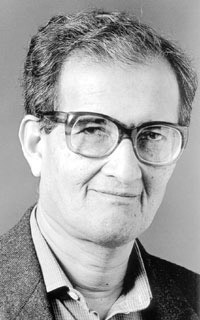 |
| Amartya Sen,from Wikimedia Commons |
Of that minority of educated people who have heard of her, very few would know more than A Vindication of the Rights of Woman; Sen, on the other hand, has drunk deeply of her previous essay, A Vindication of the Rights of Men.
She was writing of what we now call human rights, in the context of the French Revolution, but she also criticised the American experiment, founded on concepts of liberty but stained by the reality of slavery. She particularly criticised Edmund Burke for his partial views, accusing him of hypocrisy. Burke supported the calls for independence of white Americans, while ignoring the claims of black Americans; in fact, he explicitly supported slavery, on grounds of tradition and property rights. She had no truck with this, calling slavery "a traffic that outrages every suggestion of reason and religion". Sen comments:
The principal point that Mary Wollstonecraft is making here, as she does elsewhere, is that it is unsustainable to have a defence of the freedom of human beings that separate some people whose liberties matter from others not to be included in that favoured category.Sen extends this from African Americans to the untouchables of India, his home country, and to apartheid South Africa, "and to less clear-cut cases of exclusion based on class, or religion, or ethnicity". Or as others have said, no one is free till all are free.
This is not a passing reference: Sen says that "the appeal to reason in public, on which Mary Wollstonecraft insists, is an important feature of the approach to justice I have been trying to present". He also writes of her rhetorical style, how she uses "the dual functions of indignation and reasoning", concluding admiringly that she is "quite remarkable in combining wrath and reasoning in the same work (indeed, alongside each other)". The role of reason in tackling the injustices of our day is not undermined by passion, by indignation, at seeing those injustices. Sen is bringing her wider work, beyond women's rights, back into the public sphere. "Justice, by its very nature, has to have a universal reach."
If you are not familiar with Amartya Sen, of Harvard and both branches of Oxbridge, there's a Guardian profile from 2001, calling this economist "a rare example of an intellectual who has had a major effect on politics".
His work on the causes of famine changed public perceptions by showing why thousands might starve even when a country's food production has not diminished, and his analysis of poverty has been enormously influential. Arguing that simple measures of GNP were not enough to assess the standard of living, he helped to create the United Nations' Human Development Index, which has become the most authoritative international source of welfare comparisons between countries...(Among his many contributions to development economics, Sen has produced pioneering studies of gender inequality, so he always takes care to write "her" rather than "his" when referring to an abstract person).He is also known for his "Missing women of Asia" essay, originally estimated at 100 million. A brief summary of his main economic work is on this New York Times blog.
Hat tip to IntLawGrrls for alerting me to Sen's keynote at the international law conference.
Read Mary Wollstonecraft. That advice was at the core of the keynote speech that Amartya Sen delivered yesterday to open the 105th Annual Meeting of the American Society of International Law, under way through Saturday in Washington, D.C. ...In his address on the history and nature of human rights, Sen ... referred frequently to Wollstonecraft. ...[She is] often categorized as a feminist, but Sen described her more generally, as 'the most neglected thinker of the Enlightenment period.'...Insights within [her] works, Sen said, include:
► Demonstration that rights were not dependent on legislation, but rather could serve as a precedent inspiration for legislating human rights; and
► Emphasis on the importance of rights within the family.I've been meaning to write up Amartya Sen for some time; this appearance gave me the impetus. Thank you, Diane Marie Amann, one of the wide variety of "voices on international law, policy, practice" to be found on IntlawGrrls.
Beautiful and powerful speech by Sen, he really hit the nail by highlighting the importance of MW's work in a social justice scale. I'll see if I can get a hold of his work.
ReplyDeleteWere you at that keynote speech the American Society of International Law? Could you give us a flavour of it, or more particularly, how the audience took Sen's references to Wollstonecraft? I was monitoring the #ASIL tweetfeed, but didn't see much reflection.
ReplyDeleteSince Sandrine's been posting here, you might be interested in her discussion of Sen and Wollstonecraft
ReplyDelete'Why Women Hug their Chains: Wollstonecraft and Adaptive Preferences', in the philosophy journal Utilitas (link below)
http://journals.cambridge.org/action/displayAbstract?fromPage=online&aid=8094063
O honoured Praisegod Barebones, you are one step ahead of me. Earlier this week, I wrote a post about that very article; it is queued up for next week, but as you have highlighted it, perhaps I'll push it up the queue. Thanks for keeping me on my toes!
ReplyDeleteThis is often moreover a fairly good blog post that we certainly cherished analyzing. Not necessarily every single day which enjoy the chances to find a product. Immigration services in oman
ReplyDelete